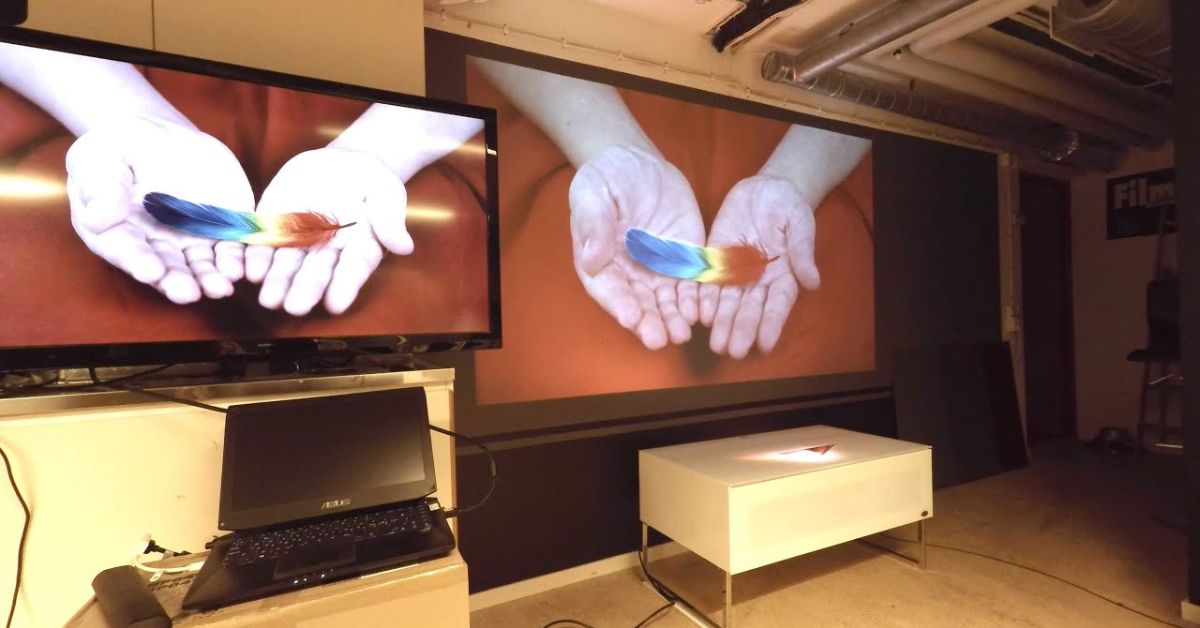This debate will never end in the world of home entertainment; fans and mere viewers continue discussing whether a TV or a projector is better. People are confused same in the TV and projector as they are in event management vs event planning.
Both have a high level of immersion; however, they also have their differences as well as other aspects that should be considered.
Purchasing a television or opting for a projector entails weighing considerations such as pictures’ quality, sizes, price, and flexibility, among other items. This detailed comparison seeks to explore these two entertainment giants at home so that you can make an informed choice, depending on which best suits your needs and spacing.
Let’s Consider the Comparison of TV vs Projector
Picture Quality
Regarding picture quality, both large TVs vs projectors have made significant strides. Modern TVs boast high-resolution displays like 4K and 8K, delivering stunning clarity, vibrant colors, and deep contrast.
The advancements in OLED and QLED technology have further enhanced picture quality by offering impressive black levels and peak brightness, making TVs an excellent choice for well-lit rooms.
On the other hand, projectors have evolved to provide remarkable picture quality, with many models offering native 4K resolution and HDR support. However, ambient light can affect projector performance, making them more suitable for dedicated home theaters or rooms with controlled lighting.
Additionally, projection screens significantly impact picture quality, affecting brightness, color accuracy, and contrast.
Size and Immersion
When choosing a projector or TV, one of the most significant advantages of projectors is their ability to create massive screen sizes, offering an unparalleled immersive experience.
Projectors can display images ranging from 60 inches to well over 120 inches diagonally, transforming your wall into a cinematic canvas. This feature makes projectors ideal for creating a theater-like experience within the comfort of your home.
Conversely, while modern TVs are available in larger sizes than ever before, they typically top out at around 85 inches for consumer models. However, this limitation might not be a concern for those with smaller spaces or seeking a more traditional viewing setup.
Versatility and Space Consideration
From a projector or TV, TVs are versatile and can fit into various spaces, whether mounted on a wall or placed on a stand. They don’t require much setup and can function well in rooms with ambient light.
Moreover, with smart TV functionalities, they offer access to streaming services, apps, and gaming consoles directly, eliminating the need for additional devices.
Projectors require adequate mounting or placement while offering a larger screen size to achieve optimal viewing. They are more suitable for dedicated home theater spaces due to light control considerations and may involve additional costs for screens, mounts, and sound systems.
A portable projector instead of TV is available for more flexible use but often sacrifice picture quality for convenience.
Cost Considerations
Regarding cost, TVs are available across a wide price range, catering to various budgets. High-end models with advanced features might be expensive, but smaller and mid-range TVs offer decent picture quality at affordable prices.
A projector instead of a TV varies in price, with entry-level models being relatively inexpensive. However, high-quality projectors with 4K resolution and superior color accuracy can be more expensive, especially when factoring in additional costs for screens, sound systems, and installation.
Longevity and Maintenance
Typically, TVs have longer lifespans and lower maintenance requirements compared to projectors. LED and OLED TVs, in particular, have impressive durability, with minimal risk of issues like image burn-in. They require minimal maintenance, usually limited to occasional software updates.
As we are talking about projector vs TV for home theater, projectors may require more maintenance, including bulb replacements after a certain number of hours, which can add to the long-term cost of ownership. Additionally, factors like dust accumulation and air filter cleaning can affect the projector’s performance over time.
Installation Process
In short, it takes less effort to set up a television compared to a projector system. However, while these large TVs are bulky and can be a bit delicate, they are easy to put into a home theatre system and operate very easily.
Also, they provide a good unification solution among other devices used at home since almost every device is directly connected to the TV, and all the control is done by the TV’s remote. Installation is simple unless you are going to hang it on a wall.
However, a wall-mounted option will also allow you to perform the DIY project. The job of their installer should be easy and cheap.
Concerning projector vs TV for home theater, installation of short-throw projectors might be quite costly, but it is less difficult than other types of projectors that are normally much more challenging to implement.
Your screen is the first issue. You may be painting a wall or installing a free-standing screen or motorized screen. Notwithstanding the process you adopt, ensure ample room for them to fit in—they can be enormous.
Smart Features
Smart features are not meant for everybody in a home TV or projector. Adverse weather conditions. With an open port, a connected set-box, a dongle, or the latest console is enough. However, numerous options are available if you are interested in a preloaded intelligent system.
Many modern projectors have built-in smart technology like those found on smart TVs. Samsung utilizes its Tizen platform for its brand home projectors; Hisense gives the Android/Google TV, similar to a Chromecast from Google.
However, brands such as Optoma have established an app store that comprises a wide selection of your favorite streaming options. Additionally, you will have an opportunity for integrated voice assistance if the platform is compatible with Alexa, Google Assistant, or Bixby.
Color Accuracy
Most people ask, are projectors better than TVs? Getting great color out of a projector without parting with too much money is possible. You can select from DLP, 3-chip LCD, and LCOS projector types for an affordable good color. However, TVs need more work involved and better processing for their best colors, which increases the cost.
In terms of color representation, although the best 4k TVs could deliver a wider range of colors, which is still beyond many consumers’ projectors today, they are not that far in a few year’s time. For instance, a large tv vs projector has a high dynamic range (HDR).
TVs take the lead when we only focus on price to performance. However, if you don’t have budget and cash consideration, go for a huge image with impressive picture quality in a lighting-controlled projection room. We can thus settle for a draw on this issue.
Last but Not Least
In the TV vs. projector debate, there is no one-size-fits-all answer. Each has its strengths and limitations, catering to different preferences, room sizes, and budgets. TVs excel in versatility, picture quality, and ease of setup, while projectors offer immersive experiences and larger screen sizes, albeit with considerations for space and lighting.
On the other hand, For events, you can consider the LED screen rental Washington DC for an immersive visual experience that you always remember in your entire life.
Ultimately, your choice between a TV and a projector should align with your specific needs and the environment where you plan to enjoy your home entertainment. Whether it’s a high-end TV’s vivid colors or a projector’s cinematic grandeur, both choices are meant to enhance your cinematic pleasure and introduce the grandeur of the big screen into your living space.

